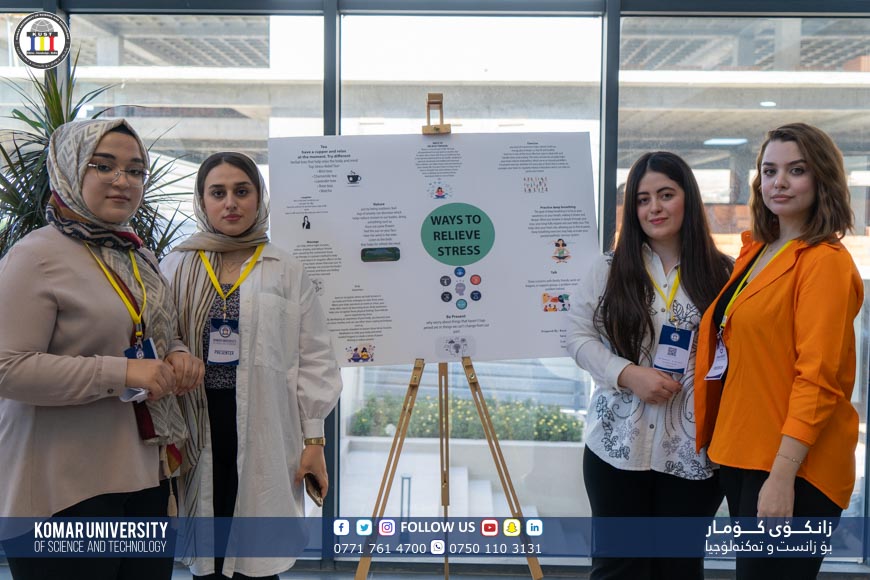Psychological Counseling unit
As PCU we are dedicated to helping students of KUST with their personal, emotional, behavioral and psychological issues. The service we are providing will always be free to undergraduate students registered at KUST and all academic and administrative staff from KUST.
Psychological Counseling unit (PCU) Services:
- Psychological testing and individual therapy
- Group and family therapy
- Psychological counseling Workshops, seminars, and orientation activities geared toward students that will help their psychological development and well-being.
Sessions at the PCU:
Counseling services are provided free of charge to the registered active KUST students.
The sessions are arranged on a day that both the client and the counselor are available.
Sessions consist of 45- 50 minute meetings with the same counselor and occur weekly.
PCU services are carried out in accordance with the Kurdish Psychological and English psychological.
Sections will relate to Association Ethics Regulation (2004), the British Psychological Society (2018), (ACA (American counseling association), 2014) And American psychology association.
Examples of areas where psychological support can be obtained from PCU:
Anxiety disorders, Exam anxiety, Depression, Adaptation problems, psychosocial problems/support, Phobias. Stress and methods of coping with stress, Anger control problems, Abuse-Neglect problems,
Academic problems, attention processes problem, Relationship problems, Procrastination behaviors, Loss and grief.
Some Important subjects
STUDY SMARTER
- You need time management: Determine how many hours you need to control class material and Set yourself deadlines
- Set a goal and
- Turnoff TV smart phone and internet: do not follow your mobile notification
- Fine your study style
- Make a connection between chapters how chapter 3 related to chapter 4
- Pay attention to what you study
- Remember more with retrieval: write down quickly or summarize everything that was going on study time by Hand rewriting.
- Test yourself :whenever you finished a chapter test your self
- Use highlights and cards and planning paper
- Reread your daily note and comments that you wrote be sure that you need it because you write it .or during study write new notes and important points
- Don’t Overdo It: it will not useful
- Stay motivated
- Change study place: The science of learning actually says you should mix up where you study
- Teach other people: it will help you more.
- Ask for help from friends and lecturer
Strategies for Managing Your Exam Anxiety
- Many students may experience more anxiety than usual during exams. This is normal and anxiety is manageable. Below are some helpful tips for dealing with exam anxiety.
- Be Organized
Become familiar with the exam’s format, including the length and question kinds.
Study hard for the test. Create a structured study schedule and follow it.
- Set attainable and realistic goals for yourself.
- Take Regular Study Breaks
- Regular breaks can help you to focus better.
- Try Mindfulness
- Mindfulness can help people to calm down. Begin being mindful during daily activities, e.g., by focusing on all five senses while brushing your teeth or drinking a cup of coffee, can calm you down and help to regulate your emotions.
Breathing technique:
The 4-7-8 is one of the breathing techniques that is a powerful way to restore balance and harmony in your mind and body, particularly during times of stress and anxiety
Box breathing allows you to balance your breath, which brings balance to your mind and body. You can repeat this exercise for 2-3 minutes or until you feel better.
- Visualize Success
- You can better cope with exam anxiety by imagining yourself doing well in the exam and being confident about it.
- Take Care of Yourself and your life style
- Eat regularly and healthy.
- Get some exercise or walking
- Keep a regular sleep routine and don’t study late. early morning is the best time for study
- Pay Attention to Your Self-Talk
- Watch how you think about exams and replace any negative and fixed thoughts with more realistic and growth-oriented ones.
NEGATIVE/FIXED THOUGHTS GROWTH ORIENTED THOUGHTS
Exams are usually difficult for me. Compared to prior exams, I have a superior study strategy for this one.
There will be challenging questions on the test. This test is a means of demonstrating what is capable of.
- Talk to Someone
- When you’re having trouble, discuss your feelings and thoughts with your friends, family, or close one
- Talking about your exam-related stress can help you gain new insights.
- Do not be afraid to seek the advice and assistance of professionals.
IMPROVE YOUR MEMORY
-
- Research suggests we remember things better and retain them longer when we associate meaning to them using semantic encoding
- Use mnemonic rhymes Mnemonics is the practice of assigning words or rhymes to represent information
- Chunk information: Chunking, or the memory tree method, is the process of classifying, or branching, things into groups.
- Visualize the item: Use a graphic like a chart to comprehend important information.
- Remain attentive: Paying close attention to a topic or event helps the neural circuits in your brain form long-term memories.
- Write down information: Even though digital tools can aid writing and note-taking, writing information down on paper helps your brain process information.
- Create acronyms: Acronyms offer another mnemonic tool to enhance your memory.
- Notice: Consciously and deliberately noticing things
- Ask: When you engage yourself in a conversation by asking questions, it’s often easier to remember the details.
- Mention: A simple tip for remembering is to say the information out loud repeatedly.
- Envision: involves associating between things to remind better
To make an appointment, please email pcu@komar.edu.iq
Dr.Shahla Ali Ahmed
Email Shahla.ali@komar.edu.iq
Office: M-Building/ 221



